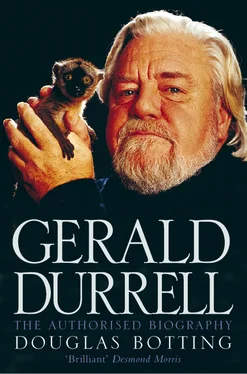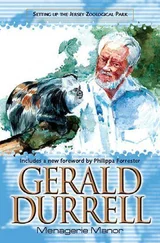By the time Mother had found what she was looking for, a family-sized house at 52 St Alban’s Avenue in the Bournemouth suburb of Charminster, much of the family was dispersed to the four winds. Lawrence and Nancy were in Athens, where their daughter Penelope was born in April 1940. Early that year Lawrence got word that his sister Margaret had married her flier, Jack Breeze, in Bournemouth, with Leslie (who was living in the house in St Alban’s Avenue) giving the bride away. When Jack was posted to South Africa with Imperial Airways, Margaret went with him, and she was to spend the whole of the war in Africa, moving gradually north, first to Mozambique and then to Ethiopia, till, like Larry, she ended up in Egypt.
When the German armies crossed the Greek border and rolled south towards Athens in April 1941, the king and government left the capital for Crete, and Lawrence and Nancy followed their example. It was a perilous and close-run thing. They escaped from the Peleponnesus by caïque one day before the Germans invaded, and after six nightmare weeks under German air attack in Crete they left on almost the last passenger ship to get out, arriving in Alexandria two days before Greece fell. Lawrence soon got a job as foreign press officer at the British Embassy in Cairo, and was to remain in Egypt for the rest of the war, but in July 1942, with the Egyptian cities under threat from the advancing Germans, Nancy and Penelope were evacuated to Palestine, a parting which effectively marked the end of the marriage. A year later Lawrence fell in love with an Alexandrian girl, Eve Cohen, who was eventually to become his second wife.
For Mother, the move back to England, with its blackouts, gasmasks and ration books, was just one more in a series of upheavals that had punctuated her life ever since, far away and long ago, she had married her much-loved and much-missed husband in India, the land of her birth. To this latest uprooting she responded as she had always done – without complaint, without fuss, making do, always there. But after the cheap living and favourable exchange rate of the Corfu years, the move back to England was a backward step financially, and leaner times now loomed. Much of the money her husband had left to her had been dissipated in imprudent disbursements before the war, and when in due course the Japanese overran Burma a substantial proportion of her remaining assets, which were invested in Burmah Oil, were lost for ever. The steady decline in the family’s standard of living in Bournemouth during the war was barely perceptible to friends and relatives who saw them on a regular basis, but to Lawrence, who was away for all of that time, its extent was quite shocking when he saw it for himself on his return.
For all that, Louisa continued to cluck and fuss over her remaining brood, an unfailing (if faintly vague) source of culinary aromas and mother love for the two sons still in her care. But for Leslie, sadly, the return to England marked a big step in his gradual descent into waste and oblivion. At the outbreak of hostilities he had hoped to join the Royal Air Force, which had both glamour and guns galore. But he had loosed off one shotgun too many in his time on Corfu, and a military medical board declared that his hearing was defective, and that he was unfit for military service. Barred from doing his bit with the RAF, Leslie was condemned to spend the war toiling away at inglorious, menial tasks in the local aircraft factory.
As for Gerald, now fifteen, the retreat to Blighty – from a sun-drenched Mediterranean island to whose human and animal fauna he had closely related, to a mist-shrouded North Sea island to which he barely related at all – was more than just a migration from one kind of habitat to another: it was like a flight into limbo, an existential near-void about which he was to say little in future years, and to write next to nothing till near the very end. The shock was palpable, and considerable adjustments were required for him to adapt to his new physical and cultural environment.
Gerald was no longer a boy, but an adolescent, with all that that turbulent transitional phase of development entailed. He was also, as a result of his upbringing on Corfu, part Greek in manners and outlook. More, he had no education – none, at any rate, that the authorities in the United Kingdom would recognise as such. Nor was he ever likely to receive any, for he was now almost past the statutory age of compulsory education in Britain. Not only had he long ago parted company with any school syllabus worthy of the name, but he stood no chance of passing any exam of any sort anywhere at any time.
Not that Mother didn’t give his education one last try, taking him along to a minor public school outside Bournemouth in the hope that the place might fire his enthusiasm. The visit was only a partial success. The headmaster chose to test the boy’s scholastic potential by asking him to write out the Lord’s Prayer, but Gerald could only remember the first six words, and invented the rest. A visit to the labs with the biology master was more promising – the man turned out to have once spent a holiday in Greece – but Gerald was rated no higher than ‘backward but bright’. Not that it mattered much, for Gerald had no wish to go to any school.
Believing, as always, that her children knew what was best for them, his mother tried a private tutor instead. Harold Binns was a neat, quiet man, with a face scarred by shrapnel in the Great War. He had written a study of the English poets, and was oddly addicted to eau de Cologne, often popping into the toilet to give himself a quick squirt. Mr Binns bestowed two great gifts upon his ill-educated student – how to unlock the treasures contained within the British public library system, and how to appreciate to the full the words of the English language in all their associations and assonances, nuances and overtones. His method was to teach Gerald for an hour, then fetch a volume of verse from his bookshelf for Gerald to browse through on his own. In an unpublished autobiographical fragment written in the last year of his life, Gerald recalled Mr Binns and the excitement he generated for the music and the magic of the language.
He would burst into the room in a tidal wave of eau de Cologne. ‘Now, dear boy,’ he would say, eyes raised to Heaven, hands outstretched. ‘Time to remove the cobwebs from the mind, eh? Leave that geometry which appears insoluble to you and let’s have a look at Swinburne. You know Swinburne? I think you’ll find he has something in common with you – yes – um – yes – um – this for a start.’
He would thrust a book into my hands and gallop out of the room trailing eau de Cologne like a bride’s train behind him.
A little later, bustling back into the room, he would ask: ‘Did you like him?’
‘I think the poetry is fascinating,’ I said, ‘and I love alliteration.’
‘So do I,’ he said fervently. ‘The whole poem is an example of what poetry should be. So few modern poets chime in the ear like a seashell whispering mysteries. At least he conjures up lantanas in your mind, illuminating your brain with fabulous words …’
All this was a revelation to Gerald, and would greatly influence him, as brother Larry had previously done, in his approach to his own writing.
While Mr Binns endowed Gerald with access to knowledge and reinforced the love of words Lawrence had encouraged on Corfu, there was no one to teach him the biology which fascinated him. Working his way at random through the textbooks in the Bournemouth public library and elsewhere, Gerald taught himself as best he could. There were advantages to this eclectic exploration of the subject, for it allowed him to approach it from eccentrically revelatory angles. But there were enormous disadvantages too, great gaps in his knowledge, and his grasp of the science could hardly be said to rest on sound foundations.
Читать дальше










